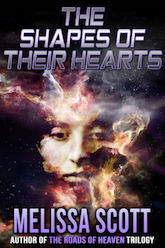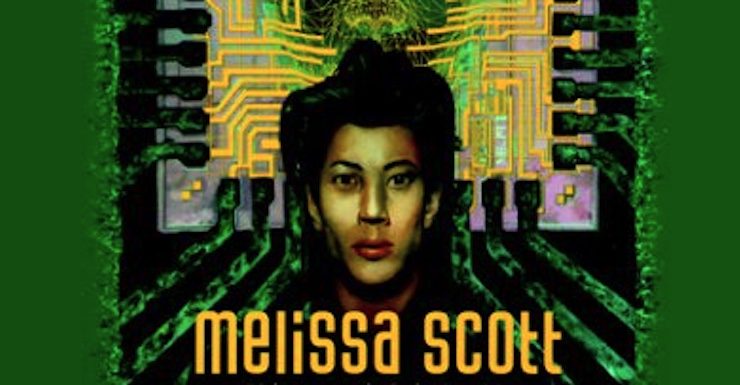It’s the middle of July—my birth month! I’m thirty-two this year, and starting to feel things begin to creak—and I’m continuing with my plan to read several novels by Melissa Scott for the first time, and write about them.
In the process, I’m discovering that I really had no idea how queer Scott’s entire oeuvre actually is. And quietly wondering if, without people like her and Nicola Griffith at work in the 1990s, we would ever have seen the flowering of queer science fiction and fantasy that’s really taken off in the last five years.
(I’m also being enormously disappointed that when I was just starting to read science fiction and fantasy, back in the late 1990s, that the bookshops I had access to stocked none of this; that I had to wait another decade, decade and a half, to see visions of the fantastic that would help me figure out my own identities and eventually, see myself among them. I was less disappointed in bookshops when I thought these sorts of books just didn’t exist.)
So, this week it’s the turn of The Shapes of Their Hearts. This novel was first published by Tor Books in 1998. Its title recalls a romance novel, but that’s a bit of a misdirection. This science fiction novel is at least two parts thriller to one part social/religious drama and one part exploration of the effects of a society structured around a religious AI, with a strong vein of cyberpunk influence.
Buy the Book


The Shapes of Their Hearts
The planet Eden is essentially a theocracy, but one with a continuing source of divine revelation. The founder of the “Seeking Children” left behind an artificial copy of himself, an AI called the Memoriant, which guides the priesthood. To the Children, FTL travel is corrupting, as are clones and any kind of genetic manipulation. That’s not the stance of the rest of settled humanity, for the most part, and Eden acknowledges the need to trade with them. There’s a spaceport on Eden, the Freeport, where disenchanted Children can go, and where interstellar traders can do business.
Unfortunately, the Children are a mass of competing revelations. They’re a proselytising group, and according to at least one of their revelations, they have a dispensation to use force to convert the rest of humanity to their ways. When an explosion linked back to the Children kills an important personage on another planet—an explosion facilitated by very advanced near-AI programming—clone Anton Sien Hsia Tso is dispatched by his family on behalf of an underworld figure to acquire a copy of the Memoriant. With him goes his bodyguard, the genetically modified Renli DaSilva. They have a tough job ahead of them: Eden is subject to a blockade which interdicts anything like AI from leaving the planet. Even communications transmissions are interdicted.
And Anton isn’t even sure if he should do it.
On Eden, Anjeillo Harijadi and Keis Imai work for the Auxiliaries, the office charged with making sure that no copies of the Memoriant make it off-planet. Their supervisors don’t trust them since their ex-partner left them to become religious—and they haven’t reported that he’s contacted them to warn them that he’s worried there’s something off about the Memoriant. Off-duty due to suspicions of their allegiances, Harijadi and Imai are recalled to work on Anton’s arrival: their boss thinks Anton’s on Eden to destroy the Memoriant, not to steal a copy, and he wants them to help.
But no sooner has Anton arrived than he’s kidnapped by Children. Leaving Renli, Harijadi, and Imai to try to get him back, and to rectify any number of problems—for it seems the Memoriant isn’t the only AI at work in Freeport’s systems.
There may be others.
Fast-paced and ambitious, The Shapes of Their Hearts is an entertaining novel. Even if it doesn’t entirely make its religious resonances wholly work.
I enjoyed it a lot.
Liz Bourke is a cranky queer person who reads books. She holds a Ph.D in Classics from Trinity College, Dublin. Her first book, Sleeping With Monsters, a collection of reviews and criticism, was published in 2017 by Aqueduct Press. It was a finalist for the 2018 Locus Awards and is nominated for a Hugo Award in Best Related Work. Find her at her blog, where she’s been known to talk about even more books thanks to her Patreon supporters. Or find her at her Twitter. She supports the work of the Irish Refugee Council and the Abortion Rights Campaign.










